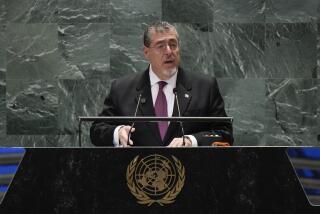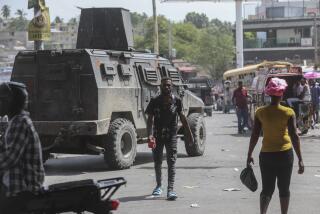U.N. Chief to Seek Longer Somalia Mission : Africa: Boutros-Ghali believes he will have up to 20,000 troops after U.S. withdraws, sources say.
- Share via
UNITED NATIONS — Secretary General Boutros Boutros-Ghali now believes that he can put together a force of 15,000 to 20,000 U.N. peacekeepers in Somalia after American troops withdraw at the end of March, U.N. sources said Thursday.
As a result, according to the sources, the secretary general is expected to ask the Security Council in the next few days to continue the controversial mission in Somalia--though in a more limited role.
Ever since President Clinton announced a withdrawal plan last October after 18 U.S. soldiers died as the result of a firefight, Boutros-Ghali has been trying to prevent a collapse of the Somalia operation by urging other countries to stay and reinforce their contingents.
Until now, however, U.N. sources have described his efforts as practically fruitless.
Most governments did not want to risk sending their soldiers to an area that the Clinton Administration had decided was too dangerous for Americans.
But Boutros-Ghali appears to have finally succeeded in persuading Third World countries to promise enough troops to maintain a viable U.N. force.
There are doubts, however, about the steadfastness of their promise.
“We have no firm commitments to speak of,” a senior U.N. official said.
The problems are both lack of money and fears of chaos.
A second senior U.N. official said that U.N. members, including the United States, are so far behind in their payments for peacekeeping that there may not be enough funds to pay the Third World troops.
On top of this, the official said, “if there is no progress” in persuading the antagonistic Somali factions to reach a political settlement, “you may have new military confrontation among the different gangs, and this may complicate the situation and we may not receive additional troops.”
*
In his latest report on Somalia, which will be delivered to the Security Council in a few days, the secretary general reportedly recommends that the United Nations try to bypass the dangerous capital of Mogadishu as much as possible in delivering food and medicine and that it no longer attempt to disarm the warring factions in the country.
U.N. troops would still have the authority to use force, but only to protect supply lines and themselves.
The size of the operation would be reduced as well.
In mid-November, the U.N. force numbered 29,000, backed up by several thousand U.S. troops operating under American command. There are now 3,000 Americans in the U.N. force and 9,500 more assigned to Somalia under separate U.S. command.
Belgium, France and Sweden had announced the withdrawal of their troops from the U.N. force even before Clinton set a March 31 date for the departure of all U.S. troops.
But it was the dramatic nature of the U.S. withdrawal under fire that prompted other countries to decide to abandon the operation.
Still, sources said that Pakistan, which has 5,000 troops in Somalia, and Egypt, which has 1,000, have agreed to augment their contingents by a total of 5,000 to 6,000.
In addition, according to these U.N. sources, Zimbabwe, Uganda, Nigeria, Morocco and Tunisia have agreed to remain, provided funds are found to pay their troops.
This would give the United Nations a force of between 15,000 and 20,000. But the force would lack the heavy firepower and equipment of the departed U.S. and European troops.
Meanwhile, there was a flare-up of violence in Mogadishu.
A U.N. military spokesman in Mogadishu said U.S. and Pakistani soldiers at a road checkpoint exchanged fire Thursday with a Somali operating a machine gun on a truck. The Somali was hit in the chest and was presumed dead.
In Kuala Lumpur, the Malaysian government announced that Boutros-Ghali has appointed Lt. Gen. Aboo Samah Aboo Bakar to take command of the U.N. military operation in Somalia, beginning Jan. 20.
More to Read
Sign up for Essential California
The most important California stories and recommendations in your inbox every morning.
You may occasionally receive promotional content from the Los Angeles Times.













